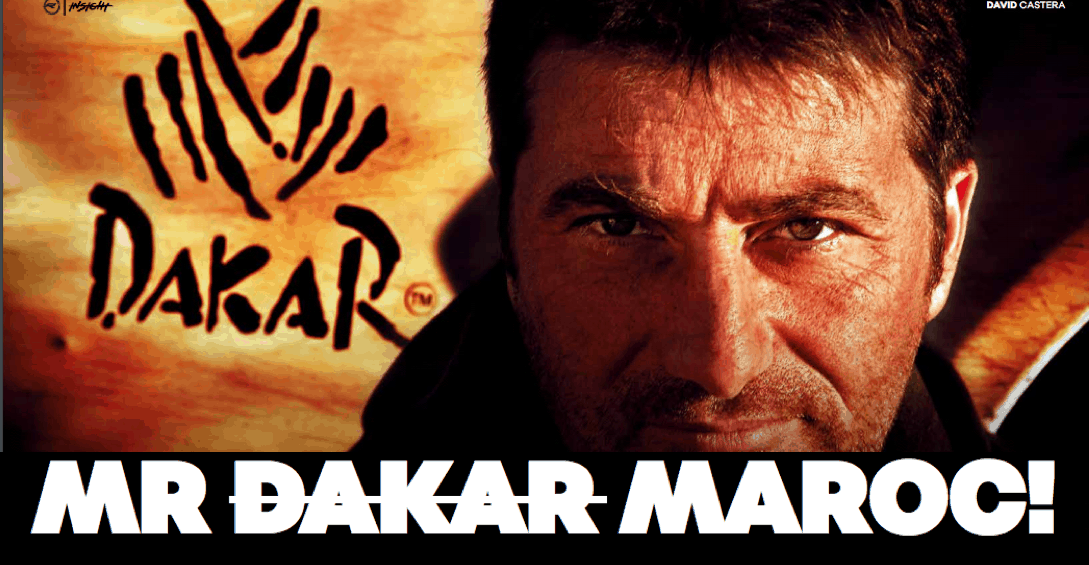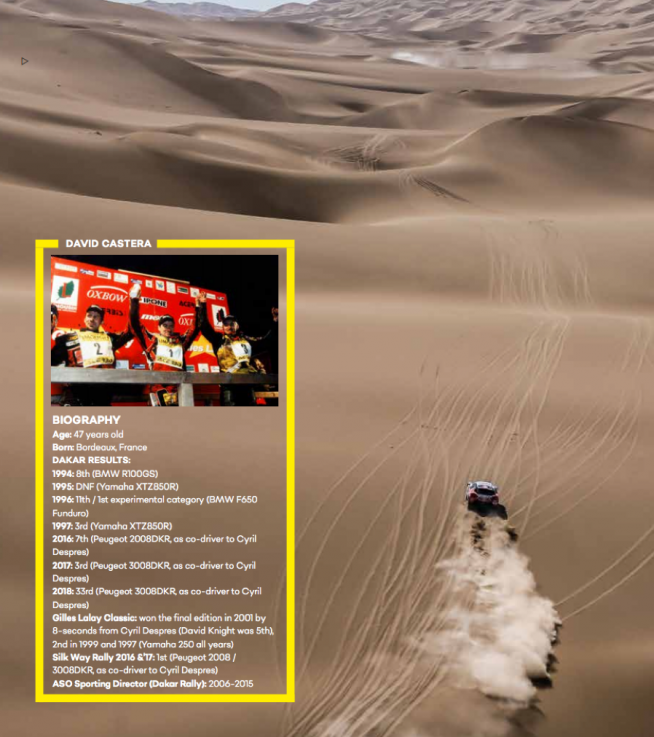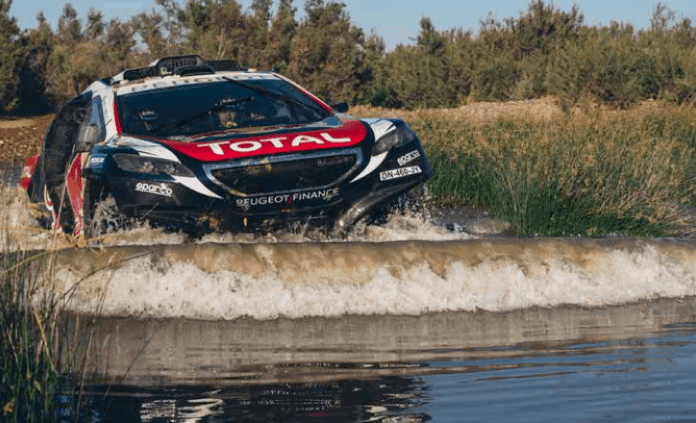Interview by Chris Evans
Few, if anybody has experienced, at first hand, as many different facets of the modern Dakar as David Castera. He’s entered the event as a privateer bike entrant, raced it as a factory Yamaha rider aboard one of their mighty 850 twins, organised it for 10 years as the Dakar’s Sporting Director and now at the age of 47 has raced it again for the third successive year as Cyril Despres’ co-driver in one of the all-conquering Peugeots 3008 DKRs (they even led the car division after two stages before hitting a rock and losing a wheel, which put them out of the running). Now as Castera returns to France he is already working on the next chapter of his rally-raid career, as the new owner of the Rallye du Maroc…
BORN TO IT
“Although there’s always a lot of luck in these things, given my background I suppose it isn’t that surprising I ended up working in rally-raid. My father had a bike dealership in a small town in the south west of France and for three years, from 1983 to 1985, he was a mechanic on the BMW factory team, spannering for Hubert Auriol and Gaston Rahier. As a small boy I remember listening to the radio reports and l became fascinated by the whole adventure. I remember my dad coming back from a Dakar and saying to me: ‘one day it will be you on one of those bikes’. In 1994 that dream came true when I entered as a privateer on a BMW flat twin prepared by myself and my dad. For a first attempt it didn’t go too badly and I managed to finish in the top 10.”
Eighth to be precise. An impressive debut performance that soon had the factory teams knocking on his door.
“Yamaha was the logical choice. They were heavily involved in rally raid and had a very professional team running 850 TDM engined prototypes and I ended up riding for them from 1995 through to 1998 as Stephane’s (Peterhansel) support rider. He did all the winning but I nevertheless managed to finish on the podium in 1997. The bikes were very powerful and only someone with Stephane’s talent was really able to exploit theirfull potential. They handled surprisingly well considering they weighed almost 240 kilos full of fuel but they were pretty scary to ride. For sure I’d have been much more at home on the 450s they ride now. I remember Stephane saying to me that when you came to a washout you had accelerate into it rather than grab the brakes. Easier said than done…” After the 1998 edition Yamaha decided to pull out, but rather than look for another factory ride Castera decided to ‘get a real job’.
RIDER TO ORGANISER
“I wasn’t a bad rally-raid rider but I wasn’t right up there with the best, plus extreme enduro was getting very big in France with the Giles Lalay Classic and so I decided to concentrate on that, which at least left me a little time to get a real job. I got three podiums in that race and managed to win the last ever edition in 2001 just in front of my now teammate Cyril Despres…” When the Gilles Lalay Classic came to an end Castera moved into event organisation, running both the French enduro championship and their crosscountry series. As a respected member of the enduro scene it was only natural for Dakar organisers ASO to approach him to look after their ‘malle moto’ entrants on the 2005 Dakar but few could have anticipated the promotion it would lead to the following year. “The Sporting Director of the time injured himself in November, just before the 2006 edition and much to my surprise they offered me the job. I’ll happily admit now I was pretty nervous going into it. As Sporting Director
you are responsible for the road book and are effectively No.2 in the organisation – there’s a huge amount of pressure. For that first edition it was even more stressful because I’d only done about a third of the reconnaissance. I was briefing the competitors in the evening on stages I’d never actually seen… But it all went surprisingly well. I’d learnt a lot already about event organisation with the French enduro championship and knew I had some ability in that department. I did the job for the next 10 years, overseeing the event’s migration from Africa to South America, which was a fantastic adventure.”
BACK TO THE TOOLS
The next logical step would have been for Castera to take over the top job and although he was widely tipped to do so, he instead took up the offer of co-driver to Dakar legend Cyril Despres in the brand new and soon to be all-conquering Peugeot Sport Team. “It’s true that a lot of people were surprised when I announced I was leaving ASO and even more surprised when they found out what I was going to do instead. But what you have to understand is that you can’t be the Sporting Director of the Dakar without being 100% committed. I moved my wife and two children out to Argentina so that I could at least see them occasionally between making the road book, and after 10 years it was time for a change.” “Many people were surprised that I accepted a job as a co-driver rather than as a driver but I had no particular track record in that department, whereas after making all those road books I certainly knew alot about navigation. I have always been interested in maps and the science of road books and so for me it was a logical choice and certainly not one I regret. It has been fantastic to work with such a professional, well-organised team and I’ve really enjoyed being part of it. Compared with a bike team, even one as professional as Yamaha’s, the means at your disposal in a top car team is absolutely unbelievable. In a factory bike team there’s one mechanic per bike, with a car you’ve got 20 per car! It’s a different world.”
REDEFINING RALLY
With Peugeot having a reputation for not staying in any one discipline for long, Castera hasn’t banked on the co-driving as a long-term position. “I never had the feeling I would finish my career as a co-driver. In my heart of hearts I always knew that I would return to event organisation, so I’ve been looking around for an opportunity for a while. When the chance came up of buying out the Rallye du Maroc I leapt at it. Having seen rally raid from so many different angles I’m not short of ideas on how to make improvements. “As far as the rally is concerned the most important innovation that I will introduce is separate routes for cars and bikes. When you’re a privateer bike rider it’s no fun looking over your shoulder the whole time, worrying about when the first factory car will be coming up behind you. And the stress of overtaking an amateur bike rider isn’t much fun for a car driver either. With the system I’ll put in place on the Rallye du Maroc that will be a thing of the past.”
Castera hasn’t forgotten his enduro roots either…
“Another area I want to improve is access to rally raid for enduro riders. We’ll be running an ‘Enduro Cup’ and I want to make it as easy as possible for enduro riders to come and try their hand at rally raid, as cheaply as possible. To this end we will have regular refuelling so that Enduro Cup participants don’t have to spend a fortune on preparing their bike and we will also be giving them the option of using an electronic road book. This will simplify navigation for them, as well as saving them the time and expense of fitting a road book reader and trip meter. Basically they’ll be able to turn up with their enduro bike and a couple of tyres and mousses and enter the race.” With his family’s long involvement in rally raid David Castera is also particularly aware of the historical context of the discipline – something that is behind his third major innovation as far as the Rallye du Maroc is concerned. “When rally raid first started back in the seventies the likes of Cyril Neveu were riding very lightly modified production machines like XT500s and in Europe it was this that kicked off the enthusiasm for trailbikes. I want to complete the circle and bring trail bikes back to the bivouac by creating an event especially for them in parallel with the rally – the Trail Desert Challenge. The two events will have the same start and finish and a common marathon bivouac, as well as sharing logistical and medical support. While there’ll be no stopwatch for the Trail Desert Challenge, as the name suggests, there will be a classification based on navigation and bike control, as well as various hard and easy options depending on rider ability. I reckon that these three elements combined; separate routes for the rally competitors, the Enduro Cup and the Trail Desert Challenge, plus a whole host of other details, will breathe new life into the discipline. At the moment I’m not quite sure what I’m more excited about, going off to race the Dakar or coming back to put the Rallye du Maroc together. But I do know I’m a lucky man…”






